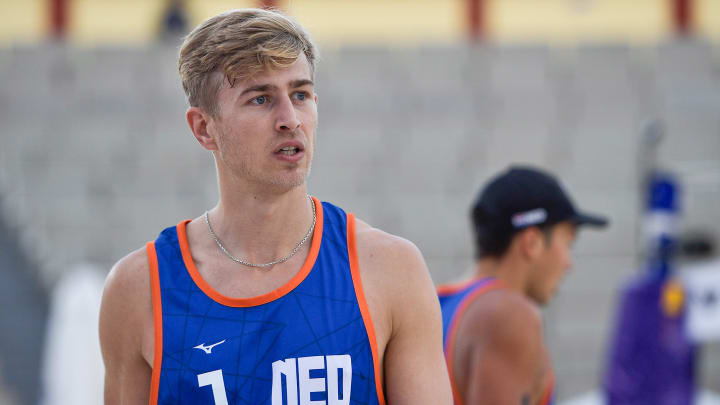The Dutch Deserve the Backlash After Letting Steven van de Velde Compete in the Olympics

PARIS — On Friday evening at the opening ceremony, IOC president Thomas Bach emerged from his sheltered seat, joined spectators in the rain (though an underling held an umbrella over his head) and told a worldwide audience what he wanted the viewers to hear:
“We all respect the same rules and each other. In our Olympic world, we all belong.”
This might (mostly) be true for games and sports. But in a larger sense, it’s not remotely true. A sporting event with competitors from more than 200 countries also involves more than 200 sets of laws and more than 200 sets of cultural norms. Harmless acts in America are felonies in some other countries; transgressions that we find heinous, others view as misdemeanors.
This, as much as anything, explains why Steven van de Velde is here at the 2024 Paris Olympics, competing in beach volleyball for the Dutch.
In 2014, when van de Velde was 19, he flew to England to meet a 12-year-old girl he knew was 12, and he raped her. To be clear: He was not accused of raping her; he was tried, convicted, and sent to prison for 13 months. He has acknowledged what he did. The facts of the case are not in dispute, but a single word in this paragraph is.
In England, he was guilty of rape.
In the Netherlands, he was guilty of fornication.
This is not a case of semantics. It is actually a reflection of Dutch laws governing sexual assault.
A new, extremely overdue sexual crimes bill was enacted in the Netherlands this month, by Dutch justice and security minister Dilan Yeşilgöz-Zegerius. “With this act, we are setting a clear standard: sex should always be consensual and equal. Someone is acting criminally if they know—or should have known—that the other person does not want to do something but continues regardless,” said Yeşilgöz-Zegerius.
But at the time van de Velde committed his crime, the Dutch Criminal Code defined rape only as forcing sex by an act of violence or any other act or by threat of violence or threat of any other act. Rather than requiring mutual consent, the code defined all sex as legal unless there was violence or the threat of violence.
If a person was convicted of rape by this standard, the maximum prison term was 12 years.
Sexually penetrating a person who was unconscious, or incapable of saying no, or otherwise unable to resist was considered a lesser crime. It carried a maximum prison sentence of eight years.
The maximum sentence for raping a child between the ages of 12 and 16 was eight years. It was illegal but not explicitly defined in the code as rape.
Raping a child under 12 carried a maximum sentence of 12 years. This was also not explicitly defined as rape.
Sexually abusing your own child, foster child or any other minor under your control carried a maximum sentence of six years.
The new law both increases penalties and removes the requirement of force. That’s progress, obviously, but also: Consent has been a legal requirement in the Netherlands for 28 days.
So when Dutch officials selected van de Velde, painting any outrage over that selection as a media creation, and describing van de Velde as “an exemplary professional and human being,” they are not simply justifying something unjustifiable. They are reflecting how Dutch law has viewed the crime of rape.
U.S. athletic federations, of course, have their own shameful history of ignoring or failing to address allegations and even incidents of sexual abuse. So it is fair to wonder if the U.S. would allow an American van de Velde to compete.
There is no way to know for sure. But the U.S. Olympic & Paralympic Committee does now have a mechanism for banning coaches or athletes like van de Velde: The U.S. Center for Safesport regularly disciplines athletes and coaches for unprofessional or criminal conduct.
Before the 2021 Olympics, Safesport suspended fencer Alen Hadzic, who faced several allegations of sexual assault. An arbitrator overturned the suspension, and Hedzic went to Tokyo as an alternate. He was not allowed to live in the athletes’ village (van de Velde is not living in the village in Paris). Now Hadzic is on Safesport’s permanently ineligible list.
“We are deeply concerned that anyone convicted of sexually assaulting a minor could participate in the 2024 Olympic Games,” says Ju’Riese Colón, SafeSport’s Chief Executive Office. “This kind of criminal conviction would violate the U.S. Center for SafeSport Code.”
Van de Velde is 29 now, a husband and father; his victim is 22. At the time of sentencing, the court heard testimony that she had been self-harming since the incident. The judge told van de Velde: “The emotional harm that has been caused to this child is enormous.”
In a 2018 interview with Dutch broadcaster NOS, van de Velde called the rape “the biggest mistake of my young life,” and said “I can’t reverse it, so I have to live with the consequences.… I can’t get around it. I can also keep blaming myself a hundred thousand times for it happening and how it happened.”
He said he thought the girl was older when he first met her online, and when she said she was 12, “I was really shocked, so I immediately broke off contact.” But then he resumed communication, and he decided to go to England. “I booked that ticket in the morning and flew out in the afternoon.”
He said that when he was 19, “I was sort of lost.”
He said that if he could go back and speak to his 19-year-old self, he would say, “Seek help.”
Today, Dutch authorities hear a man who is sorry and deserves a second chance. But you might just see a sorry excuse for a man.
